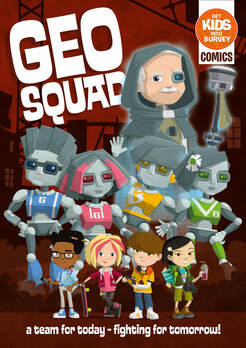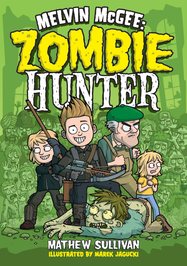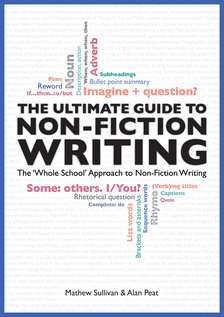|
Get Kids into Survey Comics by Mathew Sullivan, illustrated by Marek Jagucki
When Kwame, Maddison, Miles and Setsuko discover and activate four unusual VR headsets, they are contacted by a shadowy stranger: a cloaked traveller with cybernetic parts, who claims to be from a dreadful future... Before they know it, the four are transported through time, put in control of their own humanoid robots – fully loaded with salvaged surveyor tech – and tasked with saving a world on the brink of complete catastrophe! The GeoSquad comics introduce readers to the exciting world of geo-surveying, and its crucial importance in terms of human ecological impact, urban and industrial development, and global conservation. Through the time-splitting adventures of a diverse central cast – four friends with unique geological skills and interests – the comics explore the significant responsibilities we have to our planet. The team learn from the future in order to save the present, and in doing so, they raise awareness of the eco issues we face today, and what might happen if there aren’t enough people like them (i.e. the reader) – young and full of potential – to tackle the critical challenges of global conservation in the near future. Follow the adventures of the GeoSquad here! |
|
Melvin McGee: Zombie Hunter by Mathew Sullivan, illustrated by Marek Jagucki
Ever had one of those days where everything seems to go wrong? Your town gets invaded by an army of brain-scoffing zombies, you get trapped inside an armoured supermarket, and you are lumped with the responsibility of saving the world… all on your birthday! Have you ever had one of those days? You haven’t? Well, Melvin McGee is having one of those days… and it’s not even lunch time yet. SHORTLISTED FOR THE 2016 PEOPLE'S BOOK PRIZE! |
|
The Ultimate Guide to Non-Fiction Writing by Mathew Sullivan and Alan Peat
What the book will do - This book will assist schools in the process of implementing a systematic, developmental, whole-school approach to the teaching of non-fiction writing. It provides busy teachers with simple structural models for a wide range of non-fiction genres. Related language features of each genre are then made explicit, using accessible terminology for both teachers and pupils. Ready-made text examples, which include the language features, are also provided as classroom resources. |
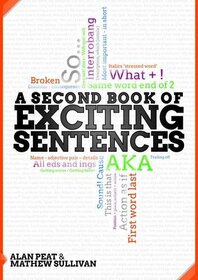
A Second Book of Exciting Sentences by Alan Peat and Mathew Sullivan
What the book will do -
It will provide thirty new sentence types, each with a simple name for both staff and pupils to use consistently.
It will link the sentence types to genres to aid planning and application.
It will include a variety of examples matched to text types and ability levels.
It will give teaching tips and activity ideas for each sentence type.
It will include a sample story comprised of exciting sentences to demonstrate their use in context.
It will feature guest pages of exciting sentences submitted by teachers and pupils from across the country.
What the book will do -
It will provide thirty new sentence types, each with a simple name for both staff and pupils to use consistently.
It will link the sentence types to genres to aid planning and application.
It will include a variety of examples matched to text types and ability levels.
It will give teaching tips and activity ideas for each sentence type.
It will include a sample story comprised of exciting sentences to demonstrate their use in context.
It will feature guest pages of exciting sentences submitted by teachers and pupils from across the country.
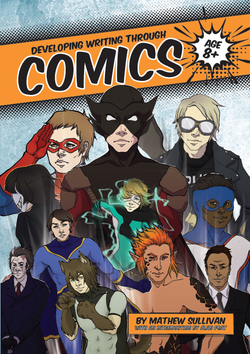
Developing Writing through Comics by Mathew Sullivan
What the book will do -
It will demonstrate how comics and hybrid texts can be used to engage reluctant readers and improve comprehension skills at all levels.
It will show how comics can be used to aid narrative planning.
It will enable teachers to use comic heroes, as well as other fictional and non fictional figures, to develop character writing.
It will provide ways of using comics to enhance locational descriptions.
It will suggest ways to use comics to make the teaching of spelling, punctuation and grammar exciting and memorable.
It will give gifted and talented pupils ways to access higher level ideas through comics.
What the book will do -
It will demonstrate how comics and hybrid texts can be used to engage reluctant readers and improve comprehension skills at all levels.
It will show how comics can be used to aid narrative planning.
It will enable teachers to use comic heroes, as well as other fictional and non fictional figures, to develop character writing.
It will provide ways of using comics to enhance locational descriptions.
It will suggest ways to use comics to make the teaching of spelling, punctuation and grammar exciting and memorable.
It will give gifted and talented pupils ways to access higher level ideas through comics.
Proudly powered by Weebly


